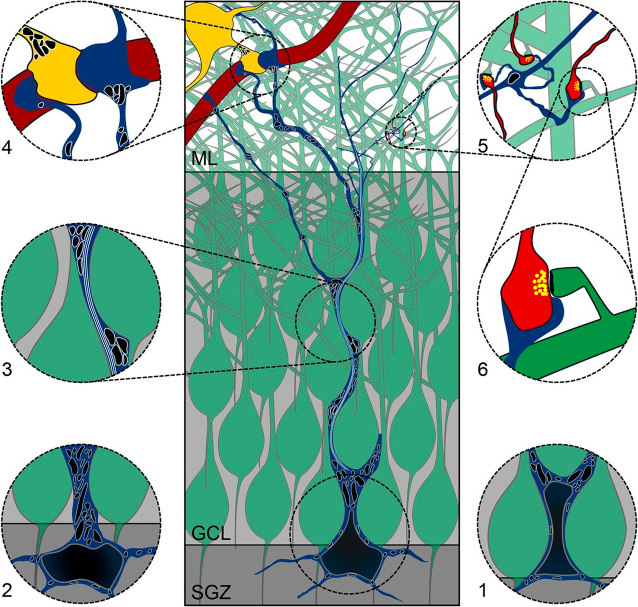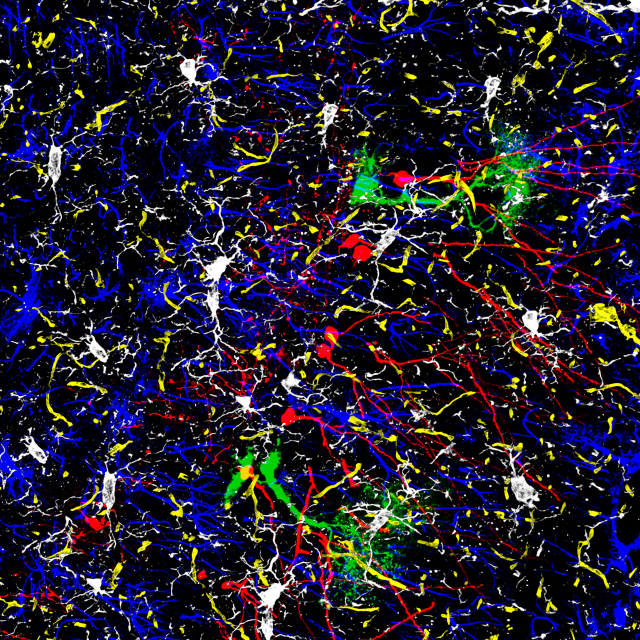- Accueil
- Recherche
- Research Centres and Units of the Department of Psychiatry
- Center for Psychiatric Neurosciences
- Adult hippocampal neurogenesis : from regulation mechanisms to functional impact
Adult hippocampal neurogenesis : from regulation mechanisms to functional impact
Vidéo : L'Hippocampe : la neurogenèse adulte et la dépression
Adult neurogenesis is the continuous formation of neurons. It occurs in two areas of the brain of all mammals: the olfactory bulb and the hippocampus. In the latter, new neurons play a crucial role in memory and mood control.
Our questions are:
- Why and how is adult neurogenesis restricted to these two areas?
- Can we enhance this mechanism and if so,does it improve memory or mood control ?
- How do new neurons integrate into the pre-existing neuronal network ?
To address these questions, we use various approaches:
- in vitro culture of adult hippocampal stem cells, neurons, astrocytes, microglia
- Large-scale biochemical analysis
- Advanced transgenic approaches
- Remote control of cell activity
- Advanced microscopy
- Behavioral tests
By better understanding how stem cells are maintained and regulated in the adult hippocampus, we hope to shed light on one of the most fascinating form of brain plasticity and maybe, use this process for novel therapies.
Research
Cells proliferate in the entire central nervous system, but only in the hippocampus and the olfactory bulb do they generate neurons. However, when proliferative cells of non-neurogenic areas are transplanted into the hippocampus, they generate neurons. Thus, the neurogenic potential of stem cells depends on their environment.
So the question is :
“What is so special about the stem cell environment in the hippocampus?“
We are addressing this question from two ends:
1. An innocent view :
What is the cellular environment of hippocampal neural stem cells?
Using novel microscopy and identification approaches, we are examining stem cells and their close environment in detail. We recently found that these cells establish very close contacts with blood vessels, astrocytes and neurons; observations that are consistent with previous work showing that adult neurogenesis is regulated by circulating blood factors or neuronal activity.
Using remote control of cellular activity we are investigating the role of these different cell types in the regulation of stem cell activity, with the hope of deciphering the neurogenic code of the hippocampus.
For more, read our recent article in PNAS 2016: Moss et al.

2. A committed view :
Do astrocytes regulate adult hippocampal neurogenesis?
Astrocytes secrete a range of molecules that play crucial roles in neuronal function. So we started investigating whether they regulate neurogenesis.
By blocking vesicular release of astrocytes, we found that they play a role in the survival and maturation of the new neurons. We identified that D-serine is required for the synaptic integration of new neurons in the mature neuronal network (Sultan et al. Neuron 2015). Interestingly, D-serine is currently tested in Human for its effects on cognition and anxiety, part of which may be mediated by adult neurogenesis. See the video highlight here .
We are now identifying other molecules released by astrocytes that regulate different stages of adult neurogenesis with the hope of improving memory performance or alleviating depression-related symptoms.

Contact
Route de Cery 11 B
CH -1008 Prilly-Lausanne
CHUV
Route de Cery 1
1008 Prilly
+41 21 314 3111: Hôpital de Cery
+41 21 314 3300: Hôpital de Prangins
+41 21 314 2511: Centre de psychiatrie du Nord vaudois
+41 21 314 1111: Centrale du CHUV



